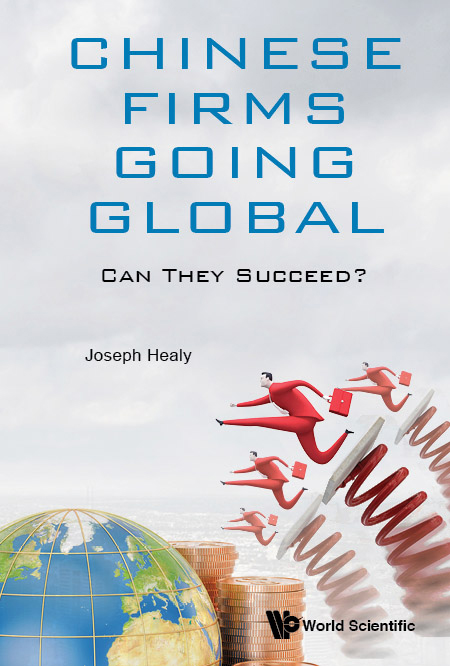Missing an opportunity
By Andrew Moody | China Daily | Updated: 2018-11-22 07:39

Banker-turned-author says Western politicians are letting down their own companies by their actions. Andrew Moody reports.
Joseph Healy believes the trade war being waged against China by the United States is driven by politics and paranoia rather than any economic imperative.
The 57-year-old banker and author of a new book, Chinese Firms Going Global: Can They Succeed?, insists that US President Donald Trump and some Western politicians are letting down their own companies by their actions.
"It (the trade war) comes from a purely political agenda. It is certainly not driven by the corporate sector," Healy says.
"The China market represents a huge opportunity for Western businesses with the huge growth in the country's middle class and the opening-up of its economy. There can't be a business anywhere in the world thinking about how to grow that is not thinking about China."
Healy, a Scot who has lived in Australia for nearly two decades, was speaking in Beijing after flying in overnight from Melbourne to promote his book.
He says he decided to write it after he completed a master's in contemporary Chinese studies in 2015-one of the no fewer than five master's degrees that he possesses-at the University of Nottingham Ningbo in eastern China's Zhejiang province.
"I wanted to write it because one thing that frustrated me living in Australia was that everything in the print media seemed to have a strong bias against China. I just felt it lacked balance and perspective," he says.
"By writing the book, I wanted to delve deeper into China and, in particular, China's place in the 21st century."
Healy was well placed to write such a book, since as a senior banker for most of his career-ending up on the executive board of National Australia Bank, one of Australia's top banks-he has dealt with many Chinese companies.
"I'd had a long career in international banking, and in the last 15 years or so I had been heavily involved with China, both with Chinese businesses and Australian and New Zealand businesses going to China. I had become fascinated by how these business ties were strengthening."
Healy's book focuses on the phenomenon of Chinese companies going abroad, which has been an increasing trend over the past 15 or 20 years. Chinese companies have had a particular reputation in recent years of buying up European engineering and technology businesses, particularly in Germany.
"This trend is often exaggerated. It is actually very similar to when Japan emerged as an international investor in the 1980s. I remember one particular article in The Economist about Japan buying up New York. When you dug deeper, they had just bought two hotels," he says.
He says there is a paranoia in some Western countries, particularly the US, since Chinese companies are seen as automatically directly linked to the Chinese government when they are not.
"People seem unable to decouple the political context from the commercial context, particularly when it comes to infrastructure assets such as electricity and other energy companies, and telecommunications," Healy says.
"There is an assumption that there are no links at all between Western governments and big businesses, despite them funding trade delegations and giving soft support for industries," he says.
Healy's main argument, however, is that far from taking over the world, Chinese companies are still taking baby steps in terms of going global.
By 2016, China's stock of outbound investment was only a 10th of that of the United Kingdom and a 20th that of the US, despite annual growth of 30 percent for more than 15 years, according to data provided in his book.
He says companies need to work in particular on what he calls the "four Cs"-core capabilities, cultural adaptability, management competence and overcoming resistance to their country of origin.
"Chinese companies don't have a long heritage of going abroad. But British companies, for instance, have been doing this since at least the 1600s with the East India Company. Companies like BP and Shell are globally-minded organizations, while Chinese companies are more Chinese-centered," he says.
He reflects also on when he worked for the US bank Citibank in the 1990s in London.
"In the London management team that I was part of, we had two Pakistanis, a Mexican, a Hong Kong Chinese, a couple of Americans, a Greek and a couple of Brits. It had cultural adaptability running through the organization, but at the same time it didn't lose its American-ness," he says.
Healy, who was brought up in Edinburgh, initially seemed destined to be a professional soccer player. He played for the Scotland youth team as well as for the youth teams of English clubs Arsenal, Millwall, Derby and Sunderland before injury ended the prospect of going professional.

The author, who retains an interest in soccer as director of the Football Federation Australia, did not complete his first degree at Edinburgh University, but started out as a business analyst for Lloyds Bank in the 1980s in London.
He settled in Australia in 2001, where he worked for ANZ Bank and then National Australia Bank. He is now the CEO and co-founder of Judo Capital, a bank that specializes in lending to small and medium-sized enterprises.
Healy says Chinese businesses should not be judged purely on their size.
According to management consultancy McKinsey & Co, 45 percent of the Fortune Global 500 companies by 2025 will be from emerging markets, a large number of them Chinese.
"Being big is one thing, but that should not be the benchmark for Chinese businesses. Chinese banks now are the biggest in the world, but they are not international," he says.
Healy is more impressed by how China is pioneering the technology for payment systems like Alipay and WeChat Pay.
"What China is doing in this area makes the West look primitive. This is one area where this capability could be exported," he says.
As was evidenced at the China International Import Expo in Shanghai earlier this month, China's own market-and particularly its middle-class consumers-represents a major opportunity for businesses around the world.
"Businesses see this opportunity in China and they want to be much closer to China. At the political end of the spectrum, that sense of strategic partnership just doesn't exist, unfortunately," he says.
However, Healy is particularly excited about the potential of China's Belt and Road Initiative.
"It is going to open up markets right across Asia, and it will touch on Europe and other places around the world. It is going to be a great opportunity for Chinese businesses and Western ones as well."
Contact the writer at andrewmoody@chinadaily.com.cn
























